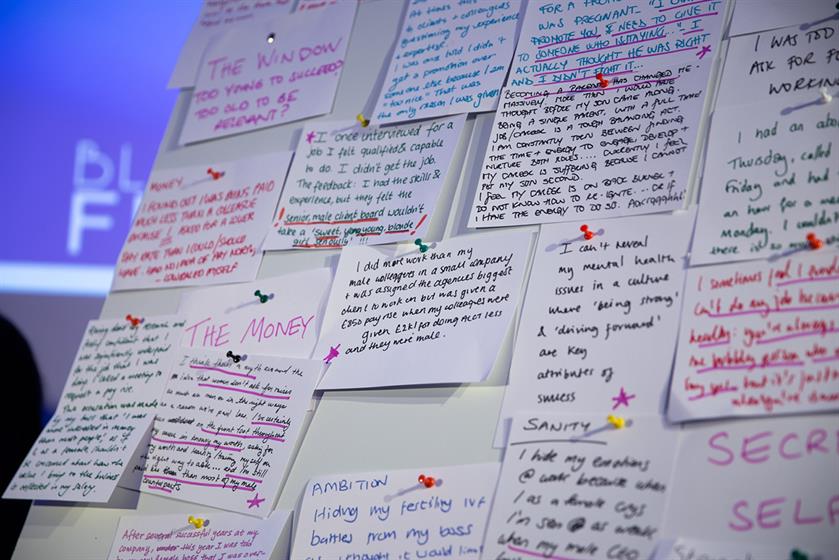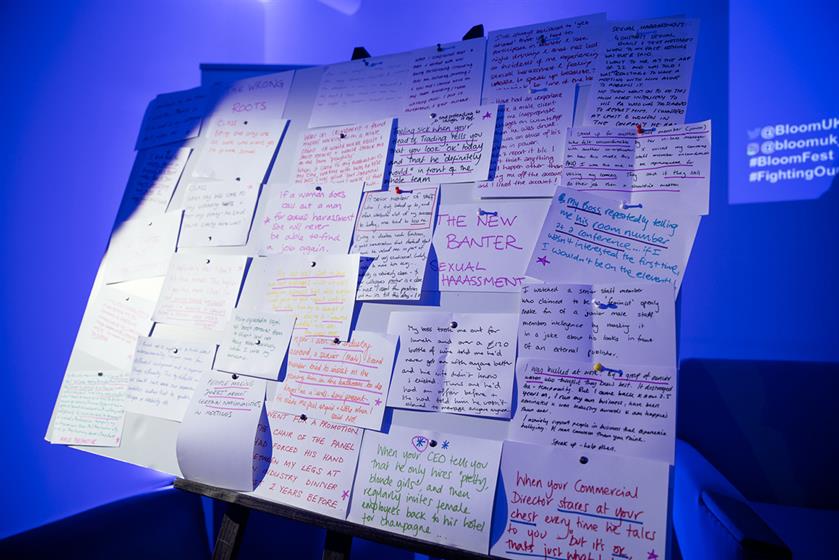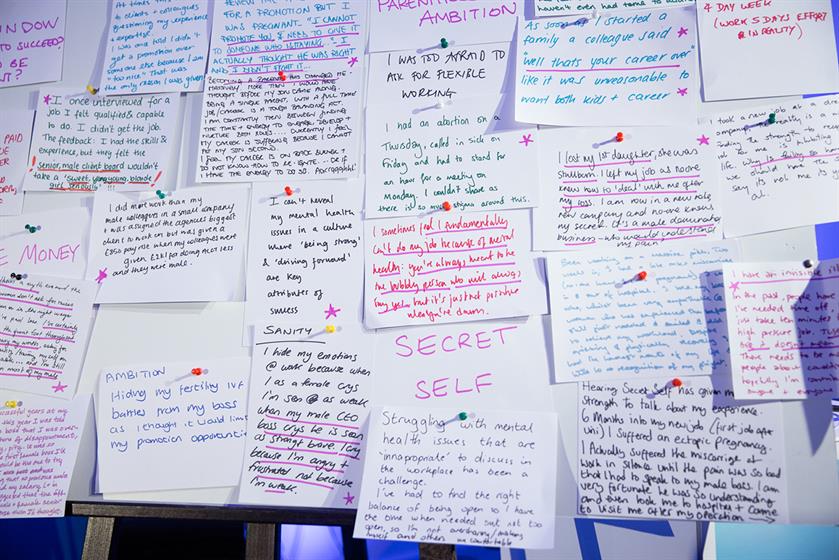"When your CEO tells you that he only hires ‘pretty blonde girls’ and then regularly invites female employees back to his hotel for Champagne."
"If a woman does call out a man for sexual harassment, she will never be able to find a job again."
"I lost my first daughter, she was stillborn. I left my job as no-one knew how to ‘deal’ with me after my loss."
"I came back to work recently, six months after having my baby. Because, to keep my role, I had to. In hindsight, it was too early and I cried in secret, not being able to continue breastfeeding."
These four personal stories pierced through the platitudes surrounding diversity in advertising, exposing the realities of forging a career as a woman in the creative industries. Shared anonymously in the "booth of truth" at BloomFest last week, collectively they formed a poignant reminder of just how far the industry has to go to create a culture in which everyone is afforded the best opportunity to thrive.
The emotional and thought-provoking event, held at Digitas and in aid of Women’s Aid, spanned a wide range of themes, from how class impacts the industry to the challenge of taking these stories beyond the echo chamber. The event’s "fighting our fictions" theme spanned both the structural and cultural changes the industry needs to make, alongside the everyday actions that can be taken on an individual level, regardless of your job title or role within an organisation.
Gina Hood, president of Bloom, the professional network for women in communications, said: "As we near the end of 2018, it feels like there is real change in the air for women in communications. The industry is becoming increasingly self-aware of the inherent barriers that women can face; it’s not just about overt sexism any more, it’s about the more passive challenges, fuelled by attitudes and assumptions about what it means to be female in the workplace."
Pointing to the wake-up calls provided by #MeToo and enforced gender pay gap reporting, Hood said the industry has been prompted to become more honest about its challenges. "This exposure of data and real experiences, such as the work done around the #TimeTo initiative, is the necessary first step to identify and accept the problems women face and, in doing so, make companies more accountable."
Noting the impact of women telling their own stories on "confessions board" at Bloom events during the year, Hood added: "Reading these deeply affected me, but also gave me hope, because once you realise it’s not just you and it’s something we all need to talk about, it’s a springboard for knowing that change must happen."
With that springboard in mind, here are some of the key themes from this year's BloomFest.
'It’s not going to take just half of us to make change happen'
Addressing the challenge of navigating "the new banter" in the post-#MeToo era, Thas Naseemuddeen, managing director and chief strategy officer at Omelet Los Angeles, underlined the importance of men and women tackling sexual harassment. She explained: "When it is just women having these conversations with each other, yes it’s empowering, yes we share our stories, yes it feels like you have another voice in the conversation – but the reality is it’s not going to take just half of us to make change happen."
This theme of collective responsibility was emphasised by Karen Fraser, director at Credos, who highlighted the role of Stephen Woodford, Matt Bourn and Luke Morris in driving change as part of the TimeTo steering committee. Lorraine Jennings, director of services at talent at Nabs, added: "We all have a collective responsibility. Every person in this room, every manager, every leader has a responsibility to be an ally. And, yes, making sure they call out behaviour and unacceptable boardroom banter."
Shifting culture
The challenge of shifting culture was highlighted by Dave Lowe, business strategy director at Digitas UK, who said: "Culture’s one of those really difficult things to change, I think, because you can’t touch it or see it. And if you think what it is, it’s a culmination of loads of people’s behaviours. So what you actually need to do is start changing the way people behave on a daily basis."
Will de Groot, head of insight and co-founder of The Elephant Room, added: "Men and women have a responsibility to think about the active role that we play, not only in our workplace cultures, but in the output as well. It’s directly linked to the output of the industry itself."
Class: the last taboo
The fact that diversity is more than skin deep was a key theme. In an open and wide-ranging discussion, Caroline Manning, strategy director of Initiative and vice-president of Bloom and Kerry Hudson, author and writer at The Pool, discussed the fact that, despite the industry’s focus on diversity and inclusion, class remains a taboo issue.
Hudson said it shouldn’t have to be a brave thing to say that you grew up on a council estate. She pointed to the structural and cultural issues that make it difficult for people from disadvantaged backgrounds to get into the industry. "A lot of entry-level positions don’t publish the starting salaries," she pointed out. "If you need to pay the bills, you need to know how much you are going to earn." In an attempt to tackle classism in the industry, she urged people to speak out when they overhear casual classism, in the same way one would if it were racism.
Hudson added: "If you have a little bit of power, pass it down. All too often, ‘cultural fit’ is just used as an excuse [for managers] to hire in their own image."
Embracing intersectionality
"We’ve seen so many brands fuck up because they don’t have the diversity on the creative teams," Leyya Sattar, co-founder of The Other Box, noted. She said the starting point is to work out who is not in the room and whose voice isn’t being heard: "It has to come from an authentic place, it has to be about who is behind the scenes and who is in front of the screen." Pointing to last year’s Tesco Christmas ad, Sattar pointed out that, while it featured a Muslim family, the supermarket does not in fact sell halal turkey.
Dannielle Beechey, technology partnerships planner at MediaCom, explained that, while the industry is willing to accept it needs diverse voices, it is not yet fully equipped to take on those voices and those perspectives to change the way it does creative work. She also urged the industry to avoid tokenism.
Beechey said: "One really important thing is that, when you ask someone from a diverse background – whether it is race, whether it's gender, whatever element of diversity they represent – don't just ask them their opinion on that thing. If you have a person of colour on your team, don't just say to them 'Hey, we have this interesting piece of work you could get involved in' just because it involves people of colour. Ask them to get involved in work that is nothing to do with how they present as a person."
A culture that lifts rather than deflates
The importance of finding a company culture in which it is possible to thrive was another key theme of BloomFest. ITV chief executive Dame Carolyn McCall urged the audience to work in a culture that lifts you rather than deflates you, explaining: "You can change lots of things as an individual, but you cannot change the culture of the organisation. If you feel it is not you – absolutely move."
McCall added: "A lot of women say: 'I'm going to wait until I have my first baby.' If the culture isn’t right when you haven’t had a child, it will amplify that once you have a child, because that is when you will need flexibility."
Holding on is not a sustainable career strategy
The disconnect between "bringing your whole self to work" and the sometimes harsh reality of life in adland was brought into sharp focus by a panel discussion on "the secret self". Introducing the theme, Victoria Brooks, head of programme at Bloom, said: "The advertising industry is a high-stakes game, moving fast and favouring the strong, leaving little room for the human challenges that face its people over the course of their careers." She warned that, by silencing struggles with mental health, fertility, sexually, grief or individual conditions, secrecy can create a less happy and productive work life. "We’re a business built around thousands of creative individuals, whose sensitive is actually the key to their creative brilliance," Brooks stressed.
The panel addressed the fact that trying to fit in can be enormously stressful and that we must be mindful of the different backgrounds and issues that people are coping with. Only by being an inclusive leader and disclosing your vulnerabilities can you create the culture in which people are free to create their best work.
Helen Calcraft, founding partner of Lucky Generals, shared her own highly personal story and vital learning – namely that holding on and trying to cope with things that are really, really difficult actually isn’t a sustainable strategy.
She explained: "It isn't sustainable for you to bury things that are hurting you; you can do that for a period of time, but eventually they come out and they show themselves. We’re all human and we cannot cope with these great stresses in life. My solution was to find two to three people I could really trust at work and reveal my struggles to them. You don't have to reveal your whole self to everybody, but finding those people you can really trust is key."








.jpg)
.jpeg)
